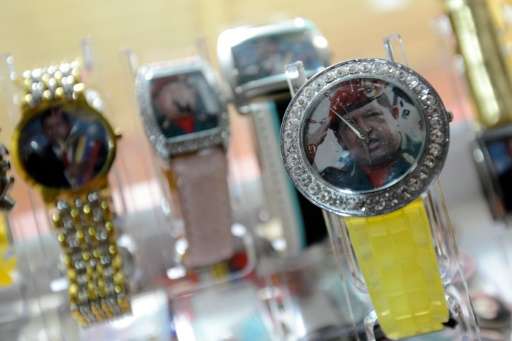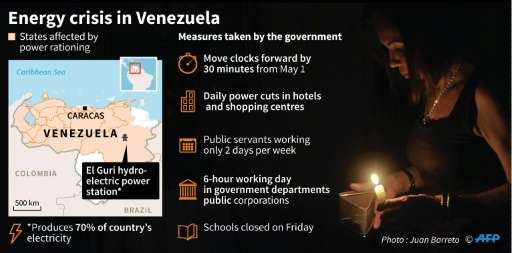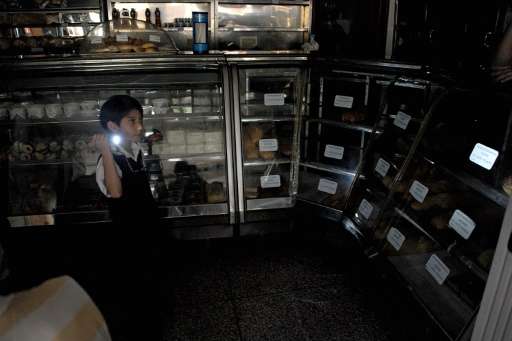Crisis-hit Venezuela sets clocks ahead to save power

With their country gripped by an economic crisis, Venezuelans lost half an hour of sleep Sunday as their clocks were set forward to save power on President Nicolas Maduro's order.
At 2:30 am local time, the oil-dependent South American nation shifted its time ahead by 30 minutes—to four hours behind Greenwich Mean Time.
The move, announced in mid-April, is part of a package of measures the embattled socialist president is pursuing to cope with a crippling electricity shortage.
Maduro's government has also instituted four-hour daily blackouts across most of the country, reduced the public-sector workweek to two days and ordered schools closed on Fridays—adding to the woes of a country already stuck in a crushing recession.
The power cuts sparked riots and looting this week in Venezuela's second-largest city, Maracaibo.
In announcing the time change, Science and Technology Minister Jorge Arreaza said the nighttime use of lighting and air conditioning was especially draining for the power grid.
"It'll be simple to move the clock forward a half-hour—this will allow us to enjoy more daylight, and it won't get dark so early," he said.
Maduro's late predecessor, Hugo Chavez, implemented the unusual half-hour time shift in December 2007, saying he didn't want children to have to walk to school in the dark. Chavez died in 2013.

Officials issued a statement saying the return to the old time zone would not affect bank transactions or flights.
Maduro blames the El Nino weather phenomenon for a drought that has reduced the lakes at Venezuela's hydroelectric dams to oversized puddles.
The dry spell, the most severe in 40 years, has especially affected the El Guri dam, which provides 70 percent of Venezuela's electricity.
But the opposition says mismanagement is to blame for the power crisis as well as the recession and shortages.
May Day pay raise
Speaking in a national broadcast on the eve of International Workers' Day, Maduro decreed a 30-percent increase in the minimum wage.
He also urged his followers to turn out en masse for May Day rallies Sunday evening.

While the pay bump may seem substantial, it brings the minimum wage to the equivalent of $40 a month at the official exchange rate, or just $14 a month at the black-market rate.
The minimum wage had already been increased by 56 percent earlier this year. But the raises are far from keeping pace with inflation, which came in at 180.9 percent last year and is forecast by the International Monetary Fund to hit 700 percent this year.
The decree, which took effect Sunday, includes raises for public workers, pensioners and members of the military.
Once-booming Venezuela, which has the world's largest proven oil reserves, has plunged into economic chaos as global crude prices have collapsed. Its economy has been in recession since 2013.
The import-dependent country faces acute shortages of food and basic goods like toilet paper thanks to a shortage of hard currency, more than 96 percent of which it gets from oil sales.
Push to recall Maduro
Maduro has vowed to press on with the socialist "revolution" launched by Chavez in 1999.
But the opposition—emboldened by winning the legislature in elections last December—is been pushing to drive him from office.
On Saturday, opponents said they gathered nearly ten times the roughly 200,000 signatures needed to begin organizing a referendum to oust Maduro.
If the electoral board accepts the signatures as valid—far from a sure bet, since opponents criticize it as loyal to Maduro—the opposition will then have to collect four million more for the board to organize the vote.
Opponents are racing to hold a referendum before the end of the year. After January 2017, a successful recall vote would transfer power to Maduro's vice president rather than trigger new elections.
A recent poll found that more than two-thirds of Venezuelans want Maduro to leave office.
© 2016 AFP


















